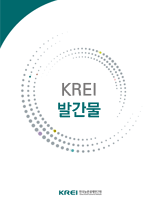요약문
우리나라는 1970년대부터 치산녹화사업을 실시하여 산림을 조성하였고, 식재된 산림의 훼손을 엄격히 제한하는 산림보전정책을 추진하였다. 그 결과로 우리나라의 산지 전체는 이용보다는 보전이 우선시되는 정책기조 하에 놓이게 되었다.
보전 위주의 임업정책은 1990년대 후반부터 산업으로서의 임업을 육성해야 할 필요성이 사유림 부문을 중심으로 나타나면서 변화의 요구에 직면하게 되었다. 이에 따라 사유림 경영을 육성하기 위한 정부시책들이 나타났고, 이것은 경제림 육성과 협업경영 및 대리경영의 도입 등으로 구체화되었다.
그럼에도 불구하고 보전 위주의 정책기조는 지금까지 바뀌지 않고 그대로 유지되고 있다. 그렇지만 현행 제5차 산림기본계획이 비전으로 삼고 있는 지속가능한 산림경영의 달성을 위해서는 산림경영의 경제성 확보가 필수적이기 때문에 지금부터라도 임업정책의 근본기조를 지속가능한 산림경영 차원에서 재검토하여 여기에 입각한 산지이용 및 산림경영정책을 수립할 필요가 있다.
이 연구는 이러한 문제의식 하에 산지이용정책의 새로운 방향을 제시하고자 한 것이다. 무엇보다 산지임대차를 둘러싼 산지이용 실태를 면밀히 조사함으로써 우리나라 산지이용의 현주소를 진단하고 나아가야 할 바람직한 방향을 제시하고자 하였다.
Background of Research
Forest areas should be utilized efficiently to increase the income in forestry management, and their use can be boosted through support policies. Forest production and management policies focused on forest trees’ growth and timber production. The policies, which have not allocated a part of forest areas for producing non-timber forest products or have not considered non-timber forestry management equally with silviculture, could not solve timber production’s low profitability. This study aims to present policy alternatives and system improvement plans to promote the use of mountain areas by seeking for ways to increase their leases.
Method of Research
This study was conducted through literature research, domestic and overseas field works, surveys on people engaged in forestry and officials in charge, and an entrusted survey on the case village. For the field survey, we investigated the current state of a typical mountain village’s land use by lot and forest owner. We also interviewed forestry holdings leasing a mountain area. For the overseas field work, we visited Switzerland and examined its present status of forest management and forest-land use. We questioned people engaged in forestry through mail surveys and interviews and the Korea Forest Service’s public officials through mail surveys.
Research Results and Implications
The case study on Hwaak-ri shows the typical Korean mountain village’s forest-land use. Forest owners are not very interested in mountain areas’ silvicultural utilization, which leads to their insufficient use. On the other hand, success factors for forestry management enterprises leasing the areas are that they produce non-timber forest products and can lease the large areas.
According to the Swiss case analysis, the country has established a forest-land use structure clearly different from an ownership structure. Compared to it, Korea has not institutionally classified the concepts of forest owners and forestry holdings.
To achieve forestry policies’ top goal of sustainable forest development, forestry management’s economic sustainability should be secured first. For this, existing laws centered on forest preservation should be changed into a balanced system coordinated with policies and projects for increasing forestry management’s economic efficiency. Accordingly, the basic policy direction needs to be modified as follows.
First, it is necessary to set principles and standards that ease regulations at the level of forest-land conservation which limit its forestry use.
Second, it is needed to abolish regulations on non-timber forest products production in forest areas and to eliminate discrimination between the timber-producing silviculture industry and the non-timber forest products industry.
Third, the total size of forest areas should be set where non-timber production forestry management is possible permanently. Fourth, it is necessary to find and support new business organizations or forest-land use plans that can contribute to improving the forestry management structure. The measures include remodelling of cooperative management, which was presented earlier, into a form that forest owners participate in holdings’ decision-making.
Researchers: Kim Soo-suk; Seok Hyun-deok; Han Hye-sung
Reserch Period: 2014. 1. ~ 2014. 10.
E-mail address: soosuk@krei.re.kr
저자에게 문의

저자소개
- 김수석
(Kim, Soosuk)
저자에게 문의

※ 퇴사하신 분이지만 아래의 내용을 입력해 주시면 관리자가 전달해드리겠습니다.
구매안내
KREI의 출판물은 판매 대행사 (정부간행물판매센터)와 아래 서점에서 구입 하실 수 있습니다.
판매대행사
- (주)정부간행물판매센터http://www.gpcbooks.co.kr사이트 바로가기
- 서울특별시 중구태평로 1가 25번지
- TEL 02) 394-0337, 734-6818
- FAX 02) 394-0339
판매서점


